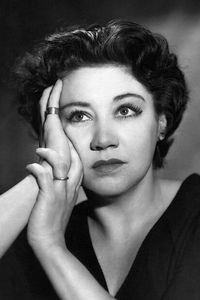Megs, an engineer's daughter, had initially aspired to become a ballerina, adopting her original Christian name Muguette. However, she abandoned this path by the age of 17, recognizing that her physique was more in harmony with her alternative first name, Megs.
Megs received her formal training in Liverpool at the School of Dancing and Dramatic Art, subsequently joining the Liverpool Repertory Company in 1933. Four years later, she relocated to London, where she appeared at the prestigious Player's Theatre.
During the 1950s, Megs established herself as a prominent stage actress, garnering critical acclaim for her performances in two plays by Emlyn Williams, 'Light of Heart' (1940) and 'The Wind of Heaven' (1945). In a departure from her usual typecast, she also portrayed the vicious and unstable Alma Winemiller in Tennessee Williams' 'Summer and Smoke' (1951).
In 1956, Megs received the Clarence Derwent Award as Best Supporting Actress for her role as the stoic wife of a longshoreman, who harbored incestuous feelings for his niece, in Arthur Miller's 'A View from the Bridge'. The previous year, she made her Broadway debut in Chekhov's 'A Day by the Sea', playing a supportive governess to an alcoholic physician.
Megs' notable screen roles include Nurse Woods in the acclaimed murder mystery 'Green for Danger' (1946),a plump and homely innkeeper who brings happiness to the title character at the end of 'The History of Mr. Polly' (1949),and three of her many housekeepers: the proper one in 'Indiscreet' (1958),the nervously anxious one sensing danger in 'The Innocents' (1961),and the warm and dependable one in the musical 'Oliver!' (1968).
From the 1960s, Megs dedicated herself to television work, starring in her own series 'Weavers Green' (1966) as a country veterinarian, and even appearing in tea bag commercials. Her versatility and popularity as an actress ensured that she remained in constant demand, never struggling to find work.



































































